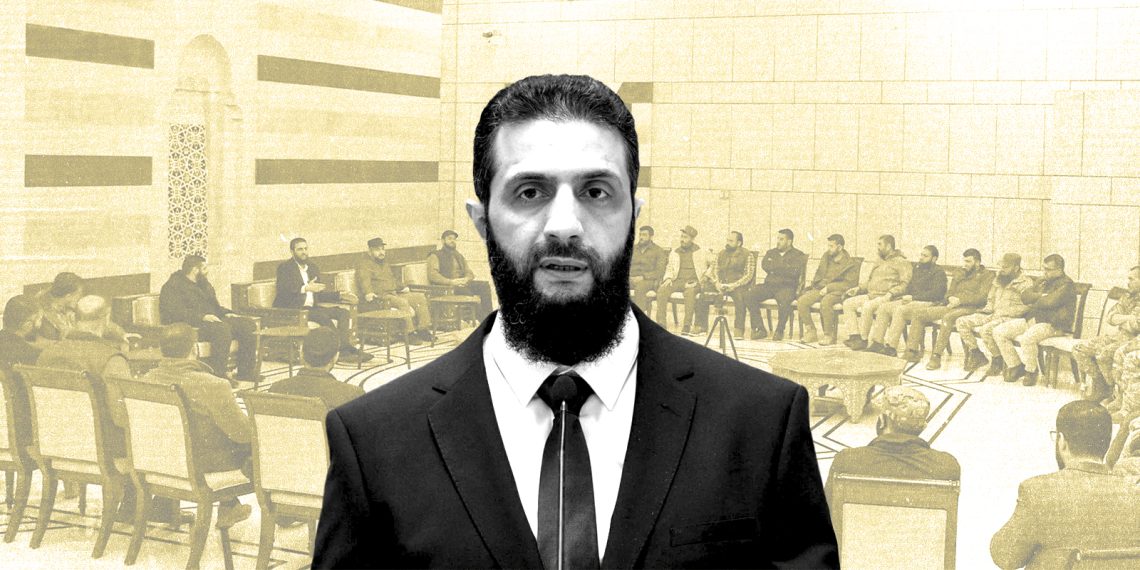The new Syrian administration, led by Ahmad al-Sharaa, has announced plans for an inclusive national conference to be held in Damascus on January 5 and 6. The conference aims to gather approximately 1,200 individuals from all Syrian governorates to discuss the transition process and establish committees to draft a new constitution. The focus will be on inviting participants in their personal capacities rather than as representatives of political entities. This raises the question: what can be expected from this conference? Will it pave the way for a clearer vision of the country’s political future amidst significant challenges on all fronts?
In a recent interview with Saudi Arabia’s Al-Arabiya channel, al-Sharaa emphasized that the conference will welcome all Syrian parties, allowing attendees to participate as individuals. A source close to the new administration had earlier disclosed to a Syrian TV channel that the preparatory committee for the conference would soon be announced. The source noted that 1,200 figures from inside and outside Syria would be invited, with each governorate represented by 70 to 100 individuals from various societal segments.
Challenges Ahead
The aftermath of the fall of Bashar al-Assad’s regime has left Syria grappling with a near-total economic collapse, decimated infrastructure, deteriorating living conditions, weakened state institutions, and a host of unresolved social and political issues. These challenges, coupled with fears of descending into security chaos, render the creation of a comprehensive political process to meet the aspirations of the Syrian people an arduous task, according to analysts.
This sentiment is reflected in al-Sharaa’s remarks about the timeline for achieving political progress. He noted that organizing elections might take up to four years, as they would require a comprehensive population census, while drafting a new constitution could take an additional three years. These statements suggest that the transitional period may be extended, given the complexities of rebuilding the state and its institutions, organizing the political process, and preparing for elections.
Al-Sharaa also clarified that the Syrian National Coalition would not receive an official invitation. “If its members wish to attend as individuals, they are welcome,” he said. However, a Coalition source told an Arab TV channel that the group would decline participation under such conditions. Coalition President Hadi al-Bahra confirmed in an interview that no formal invitation had been extended.
Seeking Inclusive Leadership
Abdulrahman al-Hajj, a Syrian researcher at the Arab Center for Research and Policy Studies in Istanbul, told the “963+” website that the conference will feature participants representing Syrian society’s diverse components, including political forces, except for the “Negotiation Commission” and the “National Coalition.” He argued that these are functional organizations whose roles have ended, emphasizing they are not political parties. Al-Hajj also noted that while forming an advisory council for the interim president has been proposed, no final decision has been made.
Syrian academic Dr. Yahya al-Aridi, based in Paris, stressed that competence and genuine representation of Syrians as citizens in a democratic state should take precedence over individuals’ status. He highlighted the need for the transitional leadership to include various political and civil groups, especially those who fought for change against the Assad regime since the revolution’s inception in 2011. Al-Aridi expressed concern that inviting participants as individuals might align the conference’s composition with the host’s agenda, potentially limiting diverse perspectives.
Dr. al-Aridi further emphasized the importance of launching two parallel tracks during the transitional phase: transitional justice to hold perpetrators of violations accountable—including the deposed regime and its collaborators—and a political and constitutional process. He also highlighted the urgent need to address pressing issues like security, economic stability, justice, health, and education.
Kadar Berry, the director of the France-based “Kurd Without Borders” organization, voiced skepticism about the conference. He suggested that al-Joulani is positioning himself as the dominant authority, reducing others to individual participants, with the exception of the Syrian Democratic Forces (SDF), which maintain organizational strength. Berry likened the initiative to the Sochi conference orchestrated by Moscow, suggesting it aims to secure broad acceptance of al-Joulani’s leadership.
A Transition Toward Democracy
Al-Hajj described the ongoing phase as a transitional journey toward democracy, acknowledging that some undemocratic elements will persist due to the nature of political transitions. However, he emphasized that the ultimate goal—a democratic system representing all Syrians—is unanimously agreed upon. During this period, al-Sharaa will act as interim president, exercising presidential powers as the leader of military operations under revolutionary legitimacy, similar to other revolutions that overthrew regimes by force.
Syrian lawyer Rawiya Aleba, based in Suwayda, echoed al-Hajj’s perspective, describing the current phase as a temporary effort to fill the vacuum. She stressed that within a month, work should commence on forming a transitional government representing all Syrians. This government should not exceed 18 months, during which it must establish a national army, draft a constitution ensuring rights, justice, and separation of powers, and set a clear agenda for Syria as a civil, democratic state.
Aleba added that the planned conference is a pilot event, while a broader, more comprehensive national conference is still under development. The latter will aim to include all political forces, opposition bodies, civil organizations, and representatives of Syria’s diverse communities without exclusion or discrimination.
A Lengthy Transition Period
Berry expressed doubts about the transitional phase, predicting that the political process will extend beyond the four years mentioned by al-Joulani. He speculated that the latter’s focus will be on consolidating his authority rather than advancing a genuine transition.
Despite the uncertainties and challenges surrounding the National Dialogue Conference, many Syrians view it as a preliminary step toward initiating a meaningful political process. The conference holds the potential to clarify Syria’s political future, address constitutional and electoral preparations, foster economic recovery, and promote inclusive participation across all sectors.
This article was translated and edited by The Syrian Observer. The Syrian Observer has not verified the content of this story. Responsibility for the information and views set out in this article lies entirely with the author.


